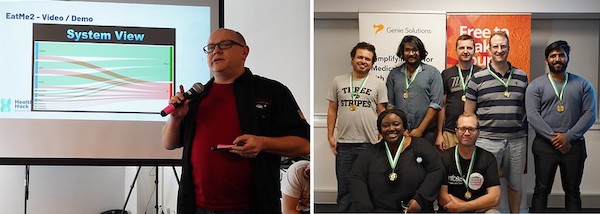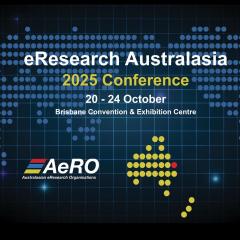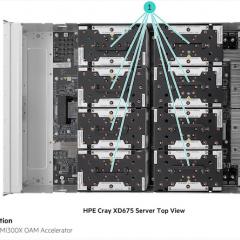
A system for improving nutrition and food waste in Australian hospitals claimed first prize at this year’s Brisbane HealthHack.
Russell Canavan, Director of Digestive Health at Gold Coast Hospital and Health Service, first brought the “Eat Me” concept to last year’s HealthHack.
This year at the hack weekend, 20–22 September at ThoughtWorks’ Brisbane office, Russell returned to have a team of volunteer coders, visualisers and user-experience designers extend “Eat Me 2” to include real-time nutrition and food waste prediction using machine learning for hospital meals from video imaging.
This automated measurement of caloric intake by patients should save hospital staff time, create less waste, improve malnutrition in hospitals, and improve recovery from illness.
This year was HealthHack’s biggest year yet with more than 100 people attending as hackers who formed into teams to work on nine projects.
RCC was a proud sponsor of this year’s hackathon.
HealthHack’s second prize went to the “CultureFluent” team, led by Metro North Hospital’s Cultural Diversity Coordinator, David Yohan. CultureFluent is a medical appointment reminder translation tool that Queensland hospitals have already expressed interest in fully integrating into their systems.
Aqeel Akber of the CultureFluent team won one of the hackathon’s ‘Supreme Coder’ awards. Aqeel is a Canberra-based computer vision and artificial intelligence researcher for CSIRO’s Data61.
RCC eResearch Analyst Dr Nick Hamilton, who has been a co-organiser and “Problem Wrangler” (in charge of vetting the research problems for hackers to solve) for HealthHack since its Brisbane launch in 2015, said CultureFluent will save lives.
“Every year, about $100,000 is wasted on translators for health appointments to which the patient does not attend. This is because people who do not speak English are being sent appointment letters in only English, which they do not understand. As well as being costly, this means many patients are missing critical appointments and some are dying as a result of not getting treatment in time.
“The [CultureFluent] solution was beautiful and translated appointments into multiple languages and was carefully designed so it would integrate seamlessly into the current Queensland Health systems. This is no doubt why it generated so much interest within hours of the project winning two awards.
“I am so happy—this is exactly why we do HealthHack and put in so much time and effort into bringing the health, research and developer communities together,” said Dr Nick. (Dr Nick was also HealthHack’s official photographer—his photographs can be viewed here.)
For the first time, children actively participated in this year’s HealthHack. The “What's up Kid?” team, led by Finlay (11) and Arwen Canavan (8), claimed bronze for a fun app’ that uses game theory and rewards to help children express their needs—such as toileting, pain and anxiety—with the overall aim of reducing stress in hospital for younger children.
Finlay and Arwen also scored the runner-up design prize and the ‘Spirit of the HealthHack’ award, alongside Nyanda Applegate, a Tabcorp Business Analyst.
“Finlay and Arwen were absolute HealthHack Problem Owner naturals,” said Dr Nick. “They really drove the project all the way themselves. It was amazing to see. The standard of problems this year has just been astounding.”
Luke Wainwright and Sue Hampton, from the Royal Brisbane and Women's Hospital, claimed the top design prize for “Juno”, an augmented reality animated full body overlay of a neonatal manikin with a suite of clinical conditions. “Juno” aims to improve diagnosis and reduce unnecessary interventions in newborn babies.
The third design prize went to “OMED Assist”, a Web app’ to assist people with chronic pain to manage their opioid medications and move them towards considering safer treatment options. Dr Rachel Elphinston, a Senior Research Fellow in the University of Queensland’s RECOVER Injury Research Centre, led the OMED team.
Two other “Supreme Coder of the Hackathon” awards went to Andrew Newton and Ashley Vidulich.
Andrew, Software Development Manager at Genie Solutions, worked on “APprove Me—Safe Sharing for Prescribers”, a website providing comprehensive information about medicinal cannabis, which Griffith University researchers Dr Monique Lewis and Professor John Flood brought to the table.
Ashley, Griffith University’s Women in STEMM Co-ordinator, worked on Griffith bicycle researcher Nina Ginsberg’s BioMap project, which developed a digital dashboard to display biometric and other data of girls in Africa riding their bikes to and from school. The dashboard will help researchers, like Nina, in their study of education access and gendered mobility in Africa and may open up other areas of research.
As well as Dr Nick, RCC staffer Thom Cuddihy, a bioinformatician, was also involved in this year’s HealthHack. Thom worked as a coder on the “Donate a Mole” team, a UQ Dermatology Research Centre citizen science project involving the capture and location of moles to help skin cancer research.



